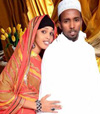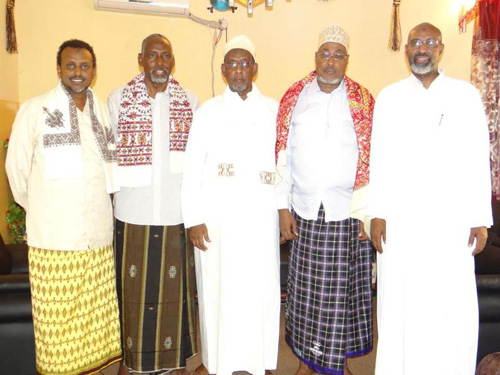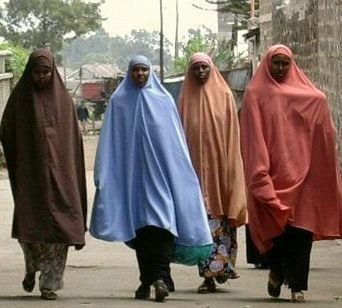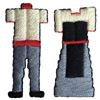 People of Somalia use their national costumes rather often. Unlike Europeans who take the traditional clothing out of the closet only for festivals and special occasions, Somalis use such garments in day-to-day life. Only in big cities people wear Western dress every day, but use traditional costumes for events and special occasions. As the climate in Somalia is hot, people cover most of the body from scorching sun and use natural materials to make clothing. They also wear loose garments (even men prefer skirt-like clothing) to prevent overheating.
People of Somalia use their national costumes rather often. Unlike Europeans who take the traditional clothing out of the closet only for festivals and special occasions, Somalis use such garments in day-to-day life. Only in big cities people wear Western dress every day, but use traditional costumes for events and special occasions. As the climate in Somalia is hot, people cover most of the body from scorching sun and use natural materials to make clothing. They also wear loose garments (even men prefer skirt-like clothing) to prevent overheating.
Men's traditional attire
Somali men wear sarong-like clothing (a long piece of cloth wrapped around the waist). Usually it is a white cotton piece, but it can also be colorful. It is called "macawiis". Similar attire is used by men in Asia, large part of Africa, Pacific islands and Arabian Peninsula. Macawiis replaces trousers for African people. They consider it to be much more convenient and efficient.
To cover the top part of the body men in Somalia use another white piece of cloth that is worn like a shawl.

Somalian men wearing sarong, kamis and koofiyad. Photo from Skyscrapercity.com
As Somalia is situated close to the Arabian Peninsula, there are some clothing items which are common for both areas. For example, Somali men wear khameez (kamis) – ankle-long attire made from natural materials. It looks like a long shirt with long sleeves. This garment helps people survive in very hot climate. That's why it is very popular in Middle East, Africa and Asia.
As headdresses Somali men wear colorful turbans and embroidered caps (called "koofiyad" and "taqiyah").
Women's traditional attire
Somali women are very conservative, so they wear clothing that covers their body entirely. Also there are a lot of Muslims in Somalia, and their attire is even more virtuous and modest. You will seldom see Somali women in depraved clothing at the streets.
Usually women use full-length dresses of many different styles. The colors of these dresses are rather conservative.
In everyday life women wear guntiino. It is a long piece of cloth which is tied over the shoulder and draped around the waist. Guntiino can be of many various styles, colors and fabrics. Traditionally it is white with decorating borders, but today women use this garment of any other colors.

Somalian women with their bodies covered. Photo from Somalia111.blogspot.com
There is special attire for formal events (like wedding or religious celebration) in Somalia. On such days women wear a garment called "dirac". It is a long light dress made from cotton, linen or polyester. It is worn over a slip and a brassiere. A silk underskirt called "gorgorad" is worn with dirac. Dirac is similar to a short-sleeved Arabian kaftan dress. It is very colorful, beautiful and charming.
Married women of Somalia always cover their heads. They use a special scarf called "shash". They can also cover the upper body with a shawl called "garbasaar". Conservative women use not only scarves but veils as well to cover the face too. Unmarried young girls sometimes also cover their heads but not often. Usually girls don't do that.

Somalian youth with museum artifacts. Photo from Somaliaonline.com
Another garment popular in Somalia is a jilbab. It covers the body except head and hands. The head is covered with a scarf or a wrap. Mostly Muslim women wear this clothing. They also use "burqa" in public. This garment covers the entire body from head to feet. Sometimes only eyes aren't covered, in other cases veils are used to cover even women's eyes.
Women of Somalia have the tradition to wearing jewelry. They often use golden and silver jewelry: necklaces, bangles, anklets and so on. The wedding attire of Somali woman is adorned in gold; there is also much jewelry on a bride. She looks like a real princess or queen.



That's what everybody in the West thinks.. In de afternoon and on Fridays men come outside with their best macawis and cumaamad.
my stupid guy they were it even in america go to somalia and you will see but Somali women just wear baati and hijab cant get over your non-somali assumptions nigga toughen tf up .